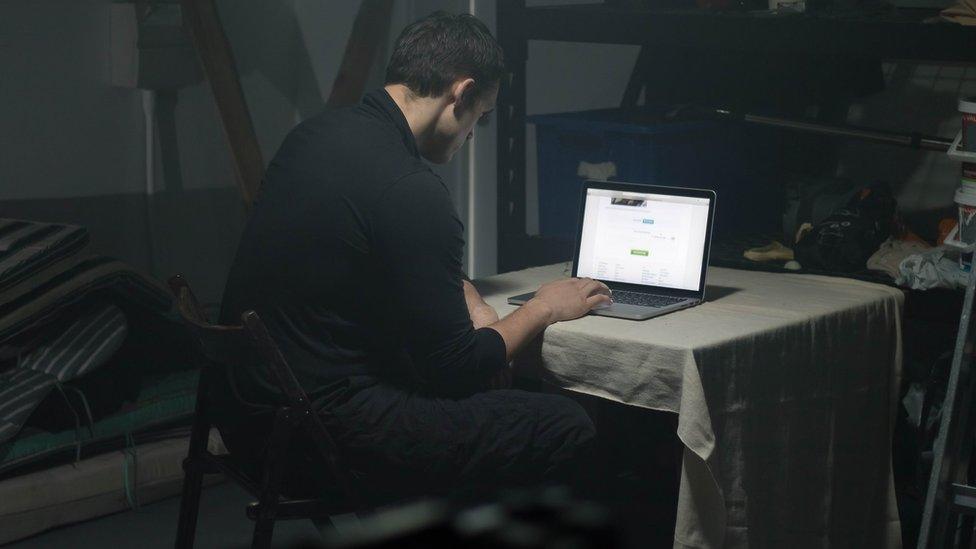Recruit 'paedophile hunters' call to help police
- Published
Seven men in the Gwent Police area have been convicted with help from hunter groups
There are calls for so-called "paedophile hunters" to be given a greater role in the fight against online child sexual exploitation.
One group that poses as children and waits for predators to make contact said it had more than 100 potential cases on its books.
The Home Office and police said it was inappropriate for the public to conduct undercover work.
Authorities urged anyone with information to instead pass it to them.
Gwent police and crime commissioner, Jeff Cuthbert, told BBC Wales' Week In Week Out programme he understood the "frustration" of the public.
"I understand in this and many other aspects of crime or anti-social behaviour that there is often an impatience and I can understand that when people want to get on with things.
"What we don't know of course is how many potential perpetrators have got away with it because it's not been done properly or walked away because it's not stood up in court, so it's a question of balance.
"The message is lets work together."
Mr Cuthbert said he was prepared to raise the issue with other senior police figures.
"Of course there are training implications, it would have to be done in a planned way - the right way - but I think in terms of the principle, it's the right way forward."

"Paedophile hunters" speak to potential offenders on the internet and apps
Since December 2016, seven predators in the Gwent Police area have been convicted with the help of the groups.
Jason Benger, 48, Ivor Gifford, 92, Ian Rothery, 53, Alan Mullen, 67, Carl O'Hehir 27, Jamie Nicholas 22, and Christopher Lane, 24, all sent explicit messages to what they thought were underage girls.
Bernard Merrells, 52, of Clydach, Swansea, was also convicted, with other cases involving hunter groups still pending.
One group, Petronus, is made up of parents who speak to potential offenders using apps.
Speaking on condition of anonymity, one mother said she started hunting because she was groomed as a 15-year-old.
She said if it could help save at least one child's, it was "a good thing".
Another member, a former police officer and survivor of child sexual abuse, said his aim was to "make it much much harder for these men to feel comfortable on the internet".
He added: "Prior to the internet, if you were the sort of man who'd target children you'd probably have to get yourself out there out of your house where you could meet children face to face - that put you at risk of exposure, but the internet has done away with that.
"It's a double life I think for a lot of these men, it's part of the thrill... but it's highly illegal and it's targeting vulnerable children."
The group does not criticise police - it said they have been efficient in dealing with the cases passed to them - but members also claim officers do not have the resources to do such regular, intense, undercover work.
Police said they would always respond to allegations and wanted undercover investigations left to them.
'Tsunami'
Different hunter groups use different tactics, with some filming "stings" and broadcasting live on social media.
When 24-year-old Christopher Lane was confronted at his home near Blackwood, Caerphilly county, his family was caught on camera.
The video was viewed more than 10,000 times. His parents have said the house had since been targeted.
His disabled mother who has cancer and his father said they were too scared to stay in their home of 26 years and have been moved to a secret location.
Assistant Chief Constable Jonathan Drake, lead officer for Operation Netsafe which tackles online child exploitation, said it had "invested significantly".
"We work with law enforcement agencies globally, we work with the National Crime Agency and use cutting edge technology," he said.
"We'll continue to do that until we're sure children are safe online."
In Operation Netsafe's first nine months, 179 people were arrested for offences including indecent images and grooming, with 125 children protected from harm.
The former head of the Child Exploitation and Online Protection Agency, Jim Gamble, described the problem as a "tsunami" which he said was "almost overwhelming" for his former colleagues.

Police have asked for undercover investigations to be left to them
"I doubt there are more than 30 officers across the UK who are actually online at this very moment masquerading undercover to engage that lower hanging fruit which is out there.
"They simply haven't got the resources to meet this head on or to even create an active and meaningful deterrent.
"They have to be extremely unlucky to be caught in some instances so we do need to turn the tables."
Mr Gamble called for 1,500 volunteers to be recruited, which he estimated would cost less than £2m a year.
"I'd like to see the government engage in a sensible conversation about how we can empower and educate ordinary citizens across the UK by giving them the opportunity to sign up to a special digital detectives programme."
The National Police Chiefs' Council said there were more than 30 officers involved, but would not say how many more.
The Home Office declined to comment on Mr Gamble's suggestion, but said it had given the National Crime Agency an extra £30m between 2015 and 2020 to tackle child sexual exploitation online.
"The issues of child protection understandably matters greatly to people, but they should allow the police and law enforcement agencies to do their vital work by not taking the law into their own hands," it said.

What is a "hunter group"?
Unregulated groups of adults who pose online as underage children
Most enter adult chat rooms and wait for predators to contact them
They claim they are inundated with requests for sexual content
Police say they are concerned with some of the tactics used by the groups, including posting videos of the stings online
Week In Week Out, BBC One Wales, 22:40 BST on Wednesday
- Published9 December 2016

- Published4 June 2015
